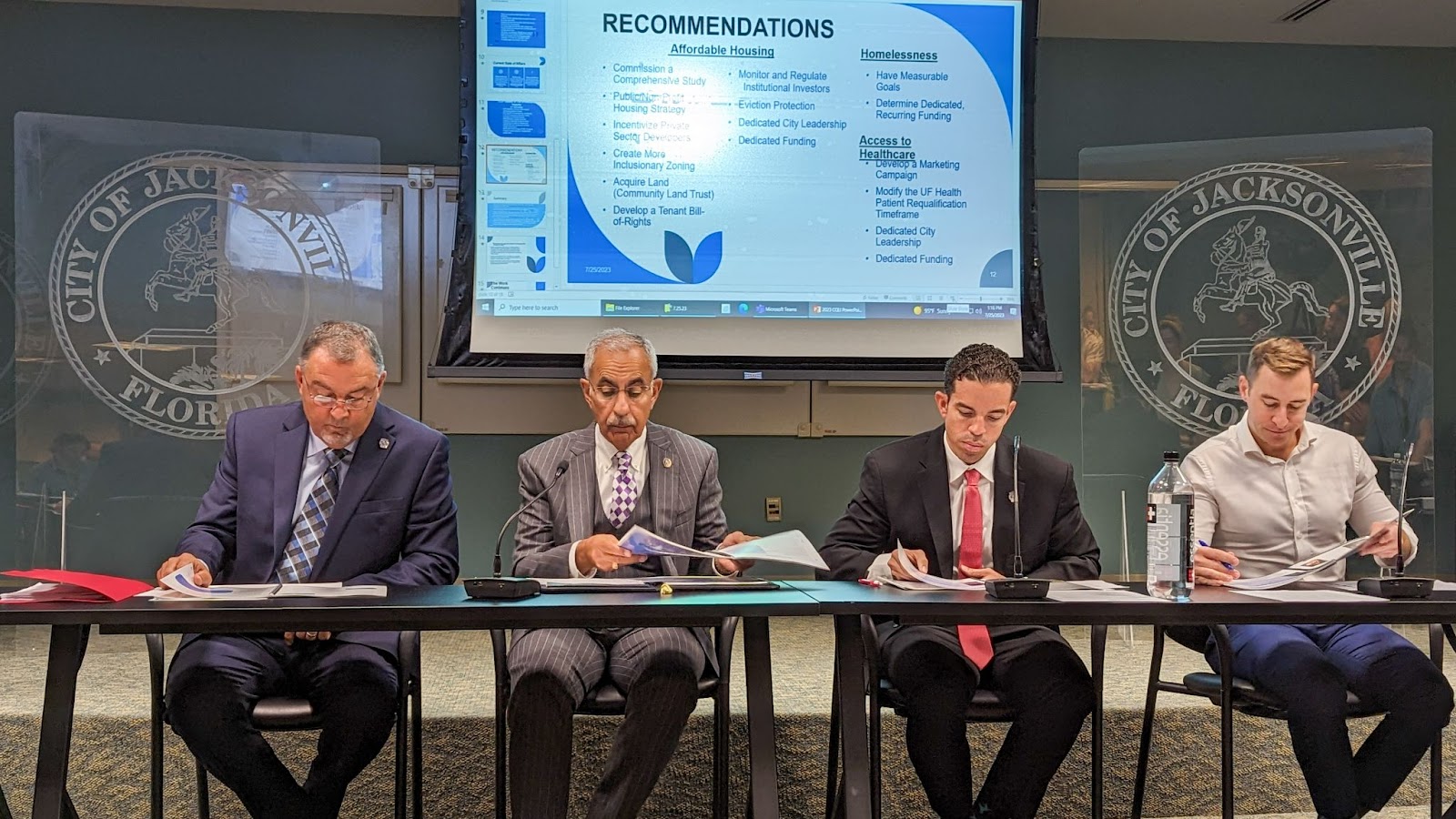Dawn Gilman repeated her mantra once again on Tuesday afternoon inside Jacksonville City Hall: Housing is health care.
Gilman is the CEO of Changing Homelessness and among the people who provided context to the Jacksonville City Council’s Critical Quality of Life Issues Committee over the last 11 months.
The Critical Quality of Life Issues report, originally presented in December, was shared with new members of the City Council on Tuesday, including Mike Gay, Raul Arias, Joe Carlucci and Jimmy Peluso.
Since draft recommendations were presented to the Council in December, the city has appropriated or steered $35.7 million in federal, state and local dollars to expand access to health care, address affordable housing and combat homelessness.
The committee is sunsetting as recently elected Mayor Donna Deegan has instituted new transition committees on affordable housing, health insurance access and more. Council President Ron Salem and committee Chairman Michael Boylan expressed their commitment to work with the mayor’s office to streamline the findings from both discussions.
Gilman told members on Tuesday that the perception that homelessness, health care access and affordable housing are not a concern for all of us is a weakness, and she pushed the city to invest more in helping people emerge from homelessness.
“We are already paying for it,” Gilman said. “We could just pay for it with a lot less money in a way more humane way.”
Similarly, Jennifer Ryan, CEO of Volunteers in Medicine, said a preventative approach would not only improve health outcomes but cost less.
“A lot of times people don’t go because they are being mistreated because of the color of their skin, or they are sick or they are poor,” Ryan said. “We need to be more accepting of all people, no matter what. …I think we need to remove barriers such as asking about citizenship or asking about where they’re born or asking for tax returns to get care. It doesn’t matter where you’re born or where you live. If you’re in our community and you’re sick, you need health care. And guess what? They are going to go to the emergency room, which is way more expensive than just having a primary care provider.”
A University of Florida study conducted earlier this year indicates that when health care providers are more welcoming and inclusive, patient health outcomes improve.
Dozens of meetings and presentations highlighted Jacksonville’s difficulty in expanding health care access to low-income residents. It’s estimated 114,000 Duval County residents do not have health insurance.
In Duval, 280,897 people were eligible for Medicaid as of last year, and it was projected 190,000 area residents would lose Medicaid eligibility once a federal Covid-19 public health emergency expired. And Florida is one of 10 states that have not expanded Medicaid coverage to low-income adults under the Affordable Care Act of 2010 — commonly called Obamacare.
Baptist Health CEO Michael Mayo told Jacksonville Today in April, when the public health emergency was about to expire, that the region’s nonprofit and faith-based institutions would help fill gaps. But Mayo said at the time, because of Jacksonville’s expansive size, a challenge is ensuring community care clinics are not concentrated in one place.
“We have community orientation in Jacksonville,” Mayo said. “And, if we can put in place care providers in those community pockets and people can access it, then they don’t have to have a lot of transportation, they can have and go through educational processes to help them learn how to take better care of themselves.”
Also in April, Mayo Clinic CEO Dr. Kent Thielen told Jacksonville Today that the Blue Zones Project Jacksonville is an example of an initiative that goes beyond health care and addresses the community’s overall wellbeing.
But since the expiration on May 11, Ryan said Tuesday, the local need has deepened.
“Every month, there’s more and more people that are losing their Medicaid coverage,” Ryan said. “The agencies that they had Medicaid with are providing them with information on what they now qualify for. But, it’s confusing. It’s complex…My biggest fear is that if people don’t know where to go, if they get sick, they go to the emergency room. And that’s not what we want. We want them to have primary care.”
The committee was formed in August of last year by then City Council President Terrance Freeman. He sought solutions that would ensure Jaxsons — Freeman pointed to first responders, teachers and seniors in a September 2022 conversation with Jacksonville Today — would have housing options amid rising inflation rates and skyrocketing housing costs. Since then, though national inflation has declined and local housing prices have begun to stabilize, more than 147,000 households are on the Jacksonville Housing Authority’s waitlist for affordable housing.
Chairman Boylan and UNF sociology Professor David Jaffee noted there may be unintended consequences from the Live Local Act (S.B. 102) that Gov. Ron DeSantis signed in May.
That law preempts local government requirements about zoning, density and height for multi-family projects in areas that are zoned for commercial, industrial or mixed-use if at least 40% of the units are devoted toward affordable housing.
Jaffee, who alongside Council member Ju’Coby Pittman, led the Affordable Housing Subcommittee, suggests Jacksonville could establish an office of housing advocacy, create a registry of landlords and enforce building codes currently on the books. None of those moves, Jaffee said, would run afoul of the new housing laws.
“Let’s take the recommendations that are fairly obvious,” Jaffee said. “We know what the range of possibilities are, and (let’s) sit down and see how they can be implemented. …There is virtually no coordinating between the various parties, the various agencies, putting together a plan and implementing it.”
Ryan, the Volunteers in Medicine CEO, pointed to Jacksonville’s penchant for commissioning reports and then ignoring their recommendations. But she said she hopes the collaboration between a bipartisan group of Council members, nonprofit leaders, neighborhood advocates and the community will separate the Critical Quality of Life Issues Committee’s findings from previous reports.
Lead image: Jacksonville City Council members Mike Gay, Ron Salem, Raul Arias and Jimmy Peluso review recommendations of the Critical Quality of Life Issues Committee that was formed in 2022 by former Council President Terrance Freeman. | Will Brown, Jacksonville Today
Corrected: This story originally said the CQLI Committee report presented in December was a draft, but it was actually the final report.







